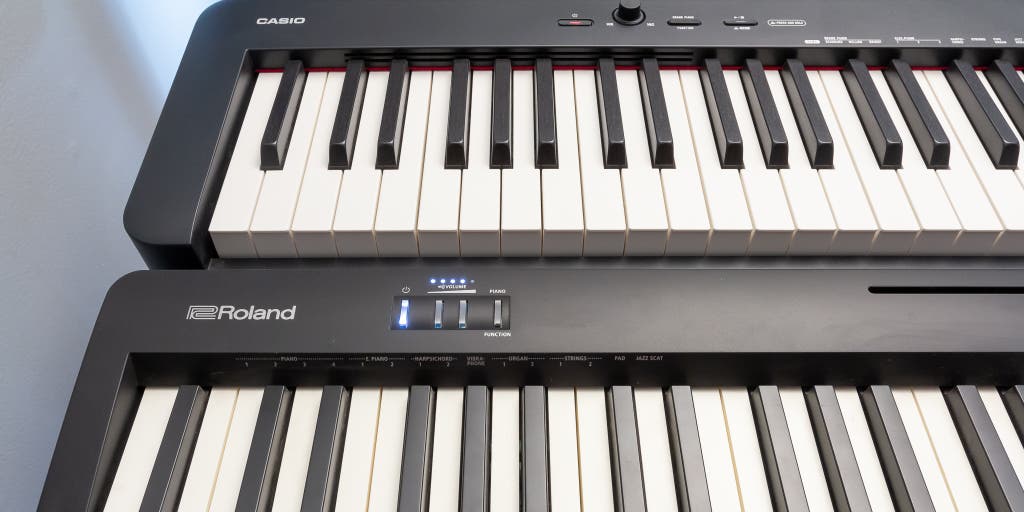1. Introduction
Learning to play the piano can be an incredibly rewarding experience. Whether you’re just starting out or you’ve been playing for years, there are several advantages to learning on a digital piano. Digital pianos offer a wide range of features and are typically much more affordable than their acoustic counterparts. In this article, we’ll discuss the benefits of learning on a digital piano, as well as some features to consider when buying one. We’ll also provide our top picks for the best beginner, intermediate, and professional digital pianos for learning.
2. Benefits of Learning on a Digital Piano
There are several advantages to learning on a digital piano rather than an acoustic one. For starters, digital pianos are typically much more affordable than their acoustic counterparts. Additionally, many digital pianos come with various features that make them ideal for learning such as built-in metronomes and different sound settings that allow you to customize your experience.
Another benefit of learning on a digital piano is that they are typically much lighter and more portable than their acoustic counterparts, making them easier to transport if needed. Lastly, many digital pianos come with headphones jacks so you can practice without disturbing others in your home or apartment building.
3. Features to Consider When Buying a Digital Piano for Learning
When buying a digital piano for learning there are several features you should consider before making your purchase:
– Weighted keys: Weighted keys give the feel of an acoustic piano by providing resistance when pressed down which helps develop proper finger technique while playing;
– Number of Keys: The number of keys will determine what type of music you can play; most beginner keyboards have 61 keys while 88 keys is considered full size;
– Polyphony: Polyphony refers to the number of notes that can be played simultaneously; higher polyphony allows for more complex pieces and layering sounds;
– Touch Sensitivity: Touch sensitivity allows the volume/tone to change based on how hard or soft the key is pressed; this helps add expression to your playing;
– Built-in Metronome: A metronome allows you to keep time while practicing which is essential for developing good rhythm and timing;
– Connectivity Options: Many modern keyboards come with USB ports so you can connect it directly to your computer or other devices and use it as a MIDI controller or sound module.
– Pedals: Most keyboards come with one or two pedals which allow you to sustain notes or add vibrato effects like those found on an acoustic piano;
– Sound Quality: The sound quality will vary depending on the model but generally speaking higher end models have better sound quality than lower end models.
4. Best Beginner Digital Pianos for Learning
For beginners looking for an affordable option with basic features, we recommend the Casio Privia PX-160BK 88-Key Digital Piano ($499). This model has weighted keys, polyphony up to 128 notes and touch sensitivity which makes it great for beginners who want a realistic feel when playing. It also comes with built-in speakers as well as headphone jacks so you can practice without disturbing others in your home or apartment building. Additionally, it has USB ports so it can be used as both a MIDI controller and sound module when connected directly to your computer or other devices.
5. Best Intermediate Digital Pianos for Learning
For intermediate players looking for something with more advanced features we recommend the Yamaha YDP184 Arius Series Console Digital Piano ($1499). This model has weighted hammer action keys which give it an even more realistic feel than the Casio Privia PX-160BK 88-Key Digital Piano mentioned above. It also has polyphony up to 192 notes along with touch sensitivity which makes it great for intermediate players who want even more expression in their playing style. Additionally, it comes with built-in speakers as well as headphone jacks so you can practice without disturbing others in your home or apartment building plus USB ports so it can be used as both a MIDI controller and sound module when connected directly to your computer or other devices.
6 Best Professional Digital Pianos For Learning
For professional players looking for something top-of-the line we recommend the Roland RD2000 Stage Piano ($3599). This model has weighted hammer action keys along with polyphony up 256 notes plus touch sensitivity which makes it ideal for professionals who need maximum expression in their playing style along with superior sound quality from its built-in speakers plus USB ports so it can be used as both a MIDI controller and sound module when connected directly to your computer or other devices.
7 Final Thoughts On The Best Digital Piano For Learning
Whether you’re just starting out or have been playing piano professionally there is no doubt that having access to quality instruments is essential in order achieve success in music production/performance/composition/etc.. With today’s technology there are numerous options available at all price points depending upon what type of player (beginner/intermediate/professional) you may be looking at purchasing something suitable within budget constraints.. Ultimately though its important not only look at technical specifications but also how comfortable/intuitive its use feels during playtime sessions!
8 Conclusion
In conclusion, there are many great options available when choosing the best digital piano for learning depending upon what type of player (beginner/intermediate/professional) needs they may have within budget constraints.. Ultimately though its important not only look at technical specifications but also how comfortable/intuitive its use feels during playtime sessions! By taking into account all these factors one should easily be able find suitable instrument(s) suitable within budget constraints!
9 Resources
> https://www.digitalpianoexpertreviewsbloggercom/best_digital_piano_for_learning

